On a day that François Hollande was inaugurated and held his first meeting with German chancellor Angela Merkel, his appointment of a new prime minister in Jean-Marc Ayrault may be the third-most important news of day in French politics.![]()
Nonetheless, Ayrault’s appointment to lead Hollande’s government is the first clear sign we have of how Hollande might govern over the next five years, long after the bloom of his (short) inaugural honeymoon is over and with many, many more meetings between the two leaders of the Franco-German axis that has traditionally moulded the European Union’s direction. It’s not quite a surprise, given that Hollande seemed to hint at the appointment last week when he said his prime minister “must know the Socialist Party well, its left-wing members of parliament and be on the best of terms with me.”
Ayrault, also the mayor of Nantes, has served as the president of the Parti socialiste parliamentary group in the Assemblée national since 1997, when Hollande was chairman of the Parti socialiste. The two worked hand-in-hand during the ‘cohabitation‘ government of prime minister Lionel Jospin, who served simultaneously with President Jacques Chirac from 1997 until the 2002 election when Jospin, in a shock result, was edged into third place by the Front national‘s Jean-Marie Le Pen.
As Le Monde put it:
Ce sont deux sociaux démocrates, deux adeptes du compromis, deux européens convaincus qui se sont donnés pour mission d’apaiser la France et de la redresser. (“The pair are both Social Democrats, both supporters of compromise, both Europeans who believe their task will be to soothe France and also to reform it.”)
Known as a quiet pragmatist, a “normal” prime minister for a “normal” president (in a presidency that may come to be more reminiscent of Pompidou rather than Mitterand), Ayrault is notably moderate, notably uncharismatic and notably Germanophile — he is a former German teacher.
So what does Ayrault’s appointment indicate about Hollande’s thinking? Continue reading Who is Jean-Marc Ayrault?
